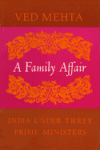
A Family Affair
A Family Affair is a sequel to Ved Mehta’s much acclaimed The New India. Together the two books recount the political history of India since Independence, in 1947. Mr. Mehta holds that India, although it is the world’s most populous parliamentary democracy, remains a feudal society, organized around principles of caste and family: Jawaharlal Nehru and his daughter, Indira Gandhi, have, between them, ruled India as Prime Ministers for all but four of its years as an independent nation, and by the mid-seventies Mrs. Gandhi’s younger son, Sanjay, had become the second most important person in the country, even though he had never been elected to public office. The so called “dictatorship of the mother and son” fell in the 1977 elections (a defeat that Mr. Mehta calls the greatest modern political upset), but Mrs. Gandhi’s successors as Prime Minister, Morarji Desai and Charan Singh, were in their turn forced out of office—in the main because of questions about the political influence of their families.
Mr. Mehta shows in detail how Mrs. Gandhi survived charges of nepotism and corruption to sweep back into power in 1980; how Sanjay was at last elected to office, as a member of Parliament; and how mother and son reestablished their court autocracy in New Delhi, with Sanjay assuming the role of heir apparent. Then, in June, 1980, at the age of thirty-three, Sanjay was killed while executing a dangerous flip in a plane over the city. Mr. Mehta goes on to show how Mrs. Gandhi’s older son, Rajiv, is carrying on the Gandhi “dynasty” in the Indian “democracy,” and how today Mrs. Gandhi is facing India’s age-old problems—poverty, overpopulation, a rigid caste system, warring states—amid gathering unrest.
Mr. Mehta disentangles the threads of connection and corruption that weave the fabric of Indian politics, pulling here to expose flagrant examples of nepotism and there to uncover illegal electoral practices. He marshals an array of facts, but his narrative reads like a good story. The personalities he describes, and occasionally interviews, take on life. There is Desai, who says that God’s will placed him in the Prime Minister’s office, but who is unmistakably an astute politician; his Minister of Health, Raj Narain, who reportedly campaigned from inside a monkey cage; Charan Singh, who, before he was named Prime Minister, made a career of being a malcontent, resigning eleven times from various offices; and, of course, Sanjay, who recklessly indulged his passion for power both in fast machines and in politics. The story, fascinating in and of itself, with its elements of mystery and Greek tragedy, is essential reading for anyone interested in understanding a complex and increasingly influential country.